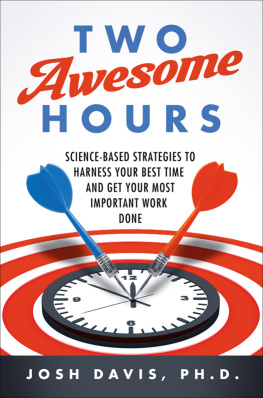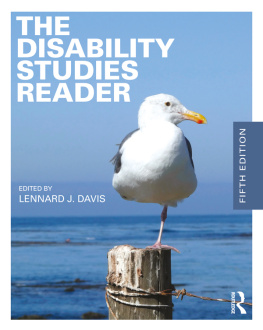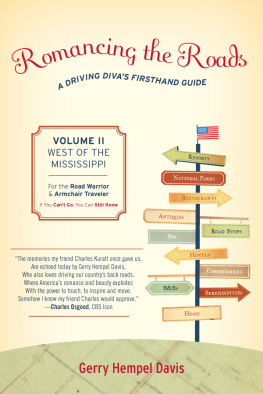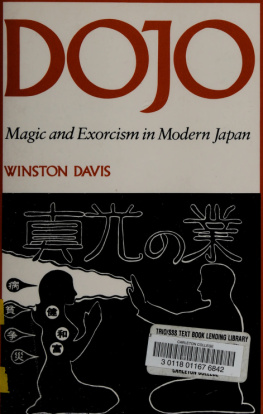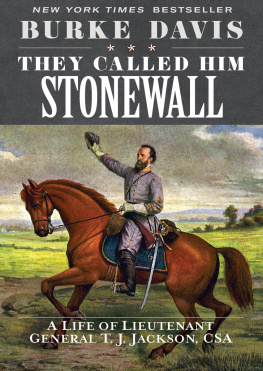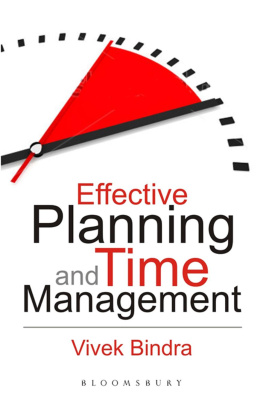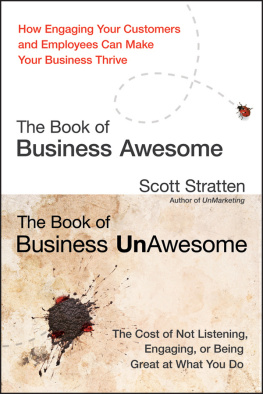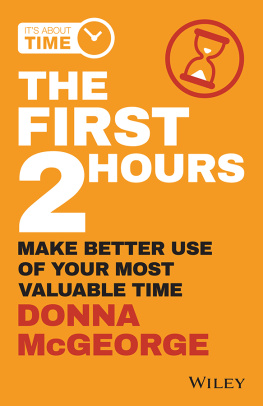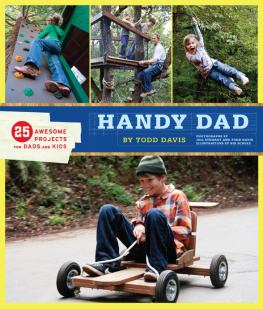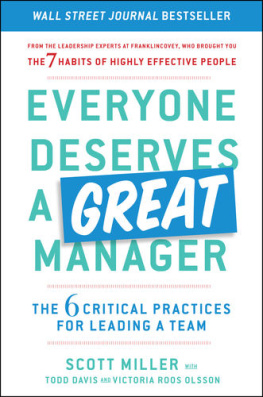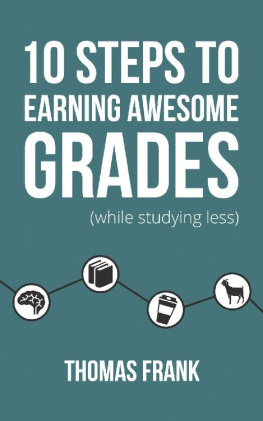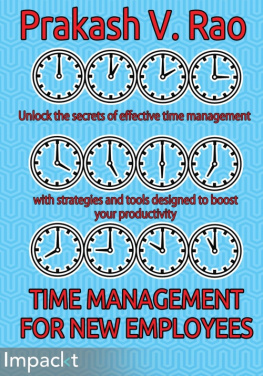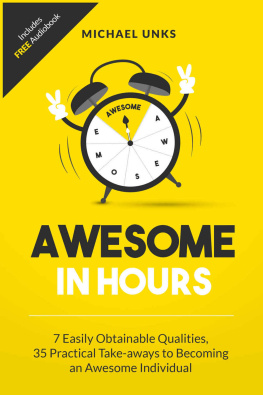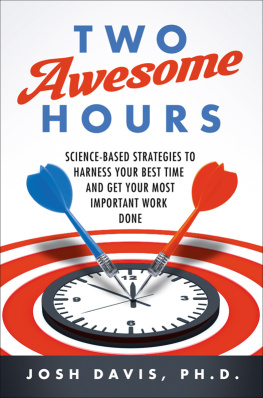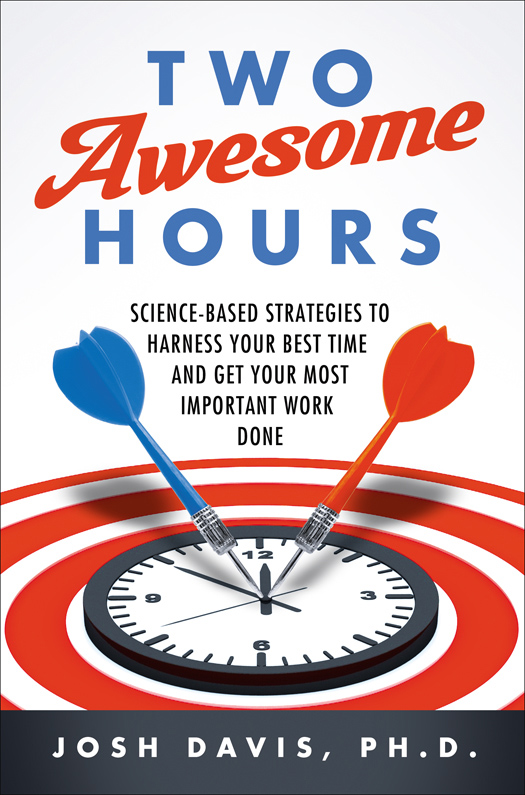To my wife, Daniela, my parents, Susan and Don,
and my brother, Kenny, for their limitless love, support,
and appreciation for who I am and what I can do.
CONTENTS
Guide
W hether we love or hate our jobs, the amount of work most of us have to do each day has reached unsustainable levels. We start a typical workday anxious about how we will get it all done, who we might let down, and which important tasks we will sacrificeagainso we can keep our heads above water.
As we grab our first cups of coffee, we check our e-mail inboxes on our handheld devices, scanning to see who has added a new task to our to-do list. The stress builds as we read e-mail after e-mail, each containing a request that we know cant be dealt with quickly. We mark these e-mails as unread and save them for... later. We mentally add them to the piles of work left undone the night before (when we left our offices much too late). More e-mails to answer, more phone calls to return, more paperwork to fill out. And everything needs our immediate attention.
In fact, too many things need our attention before we can even get to the tasks that really matterand too many things matter. We frequently work all day longat the office and then at home, taking care of our families, cleaning up, paying billssometimes only stopping to sleep. There simply isnt enough time, but so much always needs to be done.
If this sounds familiar, you are not alone. In my work as a professor, teacher, executive coach, author, and trainer, I have found these experiences are all too common among professionals and nonprofessionals at every level. More problematic, I see people from all walks of lifefrom executives to doctors to students to entrepreneurs to government workersgravitate toward the same ill-fated solutions to find relief from this work overload.
And these solutions are making the problem worse.
Over and over, I watch smart, dedicated, hard-working people fall for the trap of efficiency: We try to stay on task as much as possible, capturing any downtime throughout the day and putting it to use. If we have staff working under us, we try to get those people to do the same, for as many hours as they can pack into each day. Time-management books, gurus, and even whole consulting companies have taken up the challenge of helping us do more in less time. As my brother, a Fortune 1000 executive, says, We all have a lot of sh-t to do. Its good sh-t, but at the end of a day cramming ten pounds of sh-t into a five pound bag, were still covered in sh-t.
Other time-management experts advise us to get to what matters most first, because there may not be enough time for those tasks later. Yes, its valuable to separate the truly important from the urgent though less important. But theres something frustrating about this advice. When alls said and done, there are still a lot of things we have to do that are not the most important on the list. Some things matter because they affect our relationships, some because not doing them willin the long runget us fired, some because we agreed to a deadline and we cant flake just because something else important is on that list.
Even if these tasks are not what matter most, we may still go home feeling anxious when we dont complete them. Sure, some problems go away if we ignore them. We can get better at letting things go. But with many of our tasks, we will not be absolved of responsibility for them. Eventually, they need to get done.
If a lack of efficiency were truly the problem, most of us, including my accomplished clients, would have solved our problems by now. Choosing the right system or app to help us manage our time or prioritize our tasks would relieve the pressure of the daily grind. But quantity and capacity are not the only factors that matter, and despite working as efficiently as possible, we are still not satisfied. Many of us feel stifled rather than accomplished at the end of a typical day.
However, what we want is attainable. Most successful people I meet want two things. The first is that they want to stop feeling out of control. The second is that they want to kick butt at workthey want to be masters of their craft.
In both cases, the typical and misguided responsewhich tends to failhas been to expect ourselves to work constantly and pack more into our already packed days. Whats wrong with this approach to getting work done? And how can we improve it?
A STORY OF PRODUCTIVITY
Theres probably no one more famous for his industriousness than Benjamin Franklin. People the world over agree he was a model of effectiveness and productivity. He was frustratingly capable. His list of accomplishments is absurd: author, inventor, scientist, printer, philosopher, politician, postmaster, diplomat, and more. How can any human being do this much in a lifetime? A quick look at his rise as a printer and publisherhis primary professionsheds some light on the way he worked and, in the process, reveals a lot about what we are doing right and what we are not.
By 1724, at the age of eighteen, Ben Franklin had already apprenticed in a printing house in Boston, worked independently in a printing house in Philadelphia, and published a handful of widely read articles. That year he left for England, where he would learn the printing trade from the best, such as Samuel Palmer, a well-established printer. Not bad for a poor kid with sixteen siblings.
While working at Palmers, Franklin quickly annoyed and impressed those around him with his work ethic and cleverness. His coworkers drank beer from morning to night; he drank water so he could have the physical stamina to outperform them and save a little money. You might say it was easier to have a competitive advantage in those days, but Franklin gets credit for seeing the opportunity, taking the risk, and following through. Ultimately, he was promoted and he moved to an even better firm.
When he returned to Philadelphia a couple of years later, he was willing to do what it took to establish himself. After working for another printer for a few years, he took on debt to set up his own business. With a print shop at his disposal, and in need of cash, he identified another opportunity: publishing his own material. There was only one newspaper in town, which Franklin considered a paltry thing, wretchedly managd, no way entertaining. He knew he was the only printer in the area who also had the ability to write well, so he tried his hand at publishing newspapers and eventually Poor Richards Almanack. Almanacs have space to fill, apart from their noteworthy dates. Franklin filled the empty spaces with his (now famous) proverbs, making his almanac more entertaining and much easier to sell. Poor Richards Almanack was a hit.
In order to secure the success of his printing business, he also took on the position of clerk of the General Assembly, which allowed him to meet plenty of people who had a say in where government printing (things like ballots and money) was done, and he eventually landed the job of postmaster in Philadelphia, which helped him circulate his newspaper. These positions offered small pay and meant extra work, but they also allowed his printing business to take off, helping him become a man of some status in town.
Benjamin Franklin was and still remains a beautiful example of productivity and achievement. Work hard, take on more and more, and success will follow. Today, everyone thinks they have to be like Franklin to achieve some success. They have to do more than what seems possible. But the truth is, not even Franklin was like Franklin. As it turns out, beyond taking care of his finances, he was anything but focused on work.

